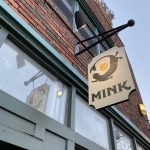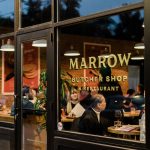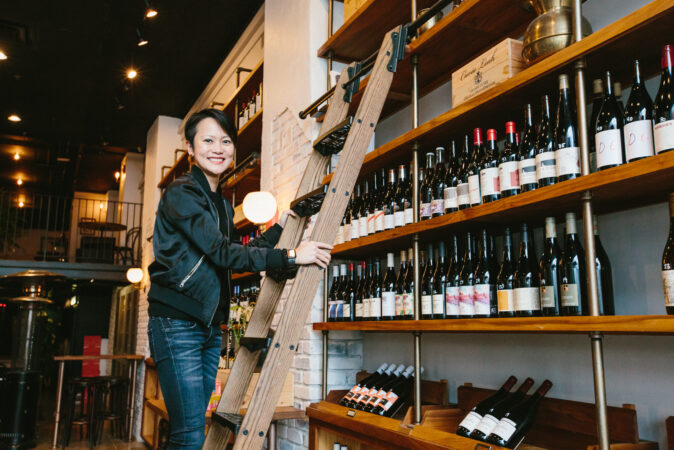On June 6, Detroitisit, is kicking off the first Business of Food Summit in Eastern Market. The summit will focus on conversations about food funding and policy, equity and justice, urban farms and grocers, and highlighting chefs and the making of the restaurants in the food space.
One of the speakers is Ping Ho of Detroit’s Backbone Hospitality Group. Here we learn more about her background, vision for her business, and how Detroit figured into her plans. The Royce was also the recipient of the inaugural Detroitisit Food Awards Best Interior Restaurant of the Year award. Watch more here.
After growing up in Singapore, attending Brown University, getting her MBA from Columbia Business School, and spending ten years in New York as a music industry executive, Ping Ho moved to Detroit and opened The Royce wine bar and shop.
She didn’t stop there.
Two years later in 2018, Ho opened Marrow, a 4-time James Beard nominated restaurant and butcher shop. She didn’t stop there either. In 2019 she and the executive chef at Marrow opened Mink, a seafood-focused restaurant.
And she’s still not stopping.
Ho is now expanding the Marrow brand to Marrow Detroit Provisions and bought a 14,000-square-foot building in Detroit’s Eastern Market that she is working on making a full-fledged USDA-inspected meat-processing facility with a butcher shop and a restaurant and event space upstairs.
DII spoke to Ho about this progression, the why and how of her move to Detroit, and the Detroit food scene.
DII: Before being a restaurant owner, you were a Vice-President at Warner Music Group in New York City. Why the change to food?
Ho: I couldn’t see myself aging in the job I had. It was a good job and I worked with many smart people but it was an industry I was not necessarily passionate about. I have an MBA and am comfortable with business planning and strategy, so I decided before I turned 40 I wanted to make a life change. So I got out of the music industry to pursue my true passion for food and wine.
DII: Why Detroit?
Ho: A combination of personal factors led me to visit the city and once I got to Detroit, I was struck by the size of the city, the architecture, the history, and the rich legacy of innovation. I decided this city afforded ample opportunity and had enough gaps when it came to competing wine bars so there was a chance to do something different here with The Royce.
DII: Has coming to Detroit and starting Backbone Hospitality been what you expected?

MINK
Ho: In some ways, I’ve been delighted, or surprised, by how fast I’ve been able to start my establishments. Since 2016, I’ve started a wine bar and two restaurants and am now working on the expansion of the Marrow brand, and I’m really grateful for the support I’ve received that has enabled me to do so.
When I opened The Royce I did not expect to start a restaurant, let alone multiple restaurants, but along the way, I had a concept for Marrow and met the right founding team to bring the vision to fruition. Now I’m expanding the Marrow brand with Marrow Detroit Provisions and working on a space on Riopelle in Eastern Market where we will process a line of USDA-inspected meat products. There will also be a butcher shop, a restaurant, and an event space on the second floor. That’s what I’m working on for next year.
DII: As a business owner in a market like Detroit how do you expand?
Ho: Brick-and-mortar retail businesses are capital-intensive. I’ve started my businesses by investing my own savings – providing “skin in the game” – and seeking investors to provide capital to close the gaps.
Finding investors is really all about networking. And showing a proven track record as an operator. Once I had a track record for running The Royce and was able to share a compelling vision and business plan for Marrow, I was able to get it off the ground. Then having a track record running a restaurant has helped me to expand it to Marrow Detroit Provisions.
DII: What is it like to be a female restaurant owner/business owner in Detroit – and one of the first females to head into this space?

MARROW
Ho: In general, in Detroit and the country, women restaurant owners and women-led hospitality groups are still the minority. But I have had a good deal of encouragement during my time in Detroit. Working with Sarah Welch the executive chef at Marrow led to the opening of Mink in Corktown. I developed relationships early on that have worked. I have a great support team. I have to point to Amanda Franke my VP of operations at Backbone Hospitality and general manager at Marrow as well. I have been leveraging the talent and skill sets of my core team to work on new projects.
My team is female-centric. I like to think we operate in our own sphere and that the way we conduct ourselves in business is based on who we are and that has contributed to our success and allowed us to expand quickly.
DII: How has the restaurant/food scene evolved since you have been in Detroit?
Ho: It has definitely evolved. There are new concepts and establishments opening at any given time. Since moving to Detroit, I have seen more people coming in from the suburbs to spend time in Detroit eating and drinking. We are seeing more diverse palettes and wine drinkers at our establishments.
DII: You have beautiful marketing. How important is it to your growth and how do you approach marketing?
Ho: We work to remain really authentic in our marketing and showcase who we are and what we offer in this authentic way. Sarah drives the social media voice at Marrow and one of my managers at The Royce drives it there. Our teams have a true passion for food and wine and that comes through in our marketing.
As my businesses mature, marketing is becoming more important. The more competitive Detroit gets the more challenging it gets to reach new customers. Also, as Marrow is not right downtown – it’s a bit of a destination – we have to work harder to get people to the West Village.
DII: What are your biggest challenges?
Ho: Right now my biggest challenge is maintaining sales growth at a faster clip than our rising costs. It’s very resource intensive to run a restaurant. We have a heavy focus on the well-being of our staff and try to enable work-life balance for our team, but with the costs of food and labor rising the financial balance can be challenging.
DII: What are your biggest opportunities?
Ho: I am laser-focused on expanding Marrow as a brand in the consumer product space. Marrow Provisions has the opportunity to go beyond Detroit now that we can produce in-house. You will see a line of Marrow Detroit Provisions specialty sausages in grocery stores in Michigan soon.
I’m excited for the Marrow brand to get to a bigger audience.
DII: What do you think the future of food in Detroit is?
Ho: The future of food in Detroit aligns with the future of food in other cities. Increasingly consumers are balancing environmental concerns with what they can buy and put on their plates while balancing accessibility, affordability, and quality. I think more consumers care about where their food comes from and I hope I’m correct in this because at Marrow that’s what we are all about.
We are working on building a sustainable supply chain – a short supply chain by sourcing from farmers in Michigan and the Great Lakes area. We want to bring awareness of local food that’s good and does not have to travel too far. Ultimately, our model aims to support our local economy with benefits to our immediate ecosystem.
I hope to see Detroit become a leading city known for driving progressive food trends and developments, such as the rise of urban farms in our city.
The Making of a Restaurant panel is 3:40-4:45 pm June 6. Panelists include chefs Jared Gadbaw, Ping Ho, and Mamba Hamissi.
Register for the one day, two-part free Summit here. 9am-5pm panels and discussions. 5:30-9pm food truck competition, cash bar, and more.
As always, be sure to subscribe to our newsletter for regular updates on all things Detroit.






















